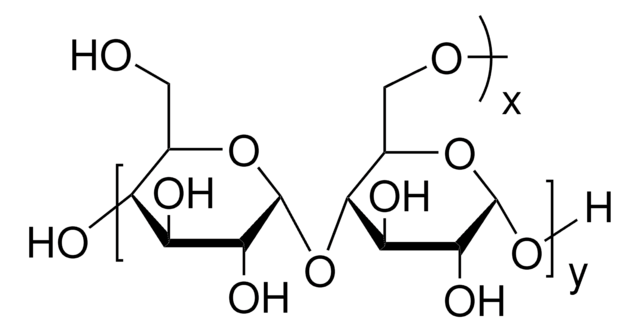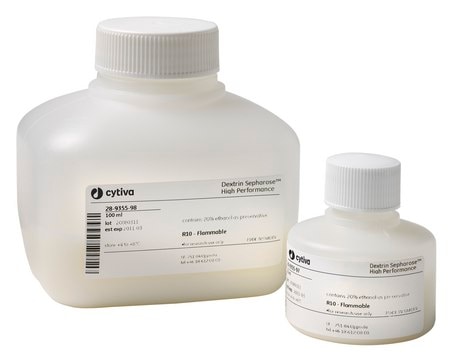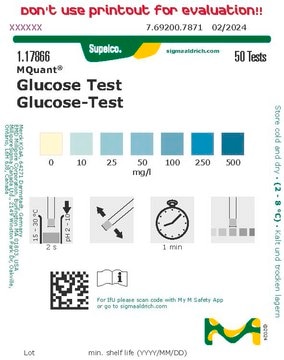Recommended Products
biological source
corn kernels
description
dextrose equivalent 16.5 - 19.5
form
powder
mp
240 °C (dec.) (lit.)
InChI
1S/C6H12O6/c7-1-3(9)5(11)6(12)4(10)2-8/h1,3-6,8-12H,2H2/t3-,4+,5+,6+/m0/s1
InChI key
GZCGUPFRVQAUEE-SLPGGIOYSA-N
Looking for similar products? Visit Product Comparison Guide
General description
Maltodextrin is a saccharide polymer that can be classified as a carbohydrate. It can be produced by enzymatic or acid hydrolysis of the starch. The material formed after purification and spray drying can be used in a variety of food and beverage products. It can be used as a good source of energy (16 kJ/g) in food products.
Application
- Formulation and characterization of catechin-loaded proniosomes for food fortification.: This study investigates the use of maltodextrin in the formulation of catechin-loaded proniosomes, highlighting its potential in food fortification applications. The results suggest significant benefits in terms of stability and bioavailability of catechins when encapsulated in proniosomes using maltodextrin (Shruthi et al., 2021).
- Impact of excipient choice on the aerodynamic performance of inhalable spray-freeze-dried powders.: This research explores how different excipients, including maltodextrin, affect the aerodynamic performance of spray-freeze-dried powders for inhalation. The findings emphasize the critical role of excipient selection in optimizing drug delivery efficiency (Wanning et al., 2020).
- Influence of spray drying on the stability of food-grade solid lipid nanoparticles.: The study examines the impact of spray drying on the stability of solid lipid nanoparticles, with maltodextrin serving as a stabilizer. The results indicate that maltodextrin effectively enhances the stability and shelf life of these nanoparticles in food applications (Salminen et al., 2019).
- The effect of binary mixture composition and magnesium stearate concentration on the Hiestand Tableting Indices and other related mechanical properties.: This article investigates the mechanical properties of tablet formulations, focusing on the role of maltodextrin in binary mixtures. The study provides insights into the optimization of tablet formulations for improved mechanical strength and performance (Likitlersuang et al., 2007).
- The 3D model: explaining densification and deformation mechanisms by using 3D parameter plots.: This paper presents a comprehensive model to explain the densification and deformation mechanisms in tablet formulations, using maltodextrin as a case study. The 3D parameter plots offer a detailed understanding of the compaction behavior of pharmaceutical excipients (Picker, 2004).
Storage Class Code
11 - Combustible Solids
WGK
WGK 1
Flash Point(F)
Not applicable
Flash Point(C)
Not applicable
Personal Protective Equipment
dust mask type N95 (US), Eyeshields, Gloves
Certificates of Analysis (COA)
Search for Certificates of Analysis (COA) by entering the products Lot/Batch Number. Lot and Batch Numbers can be found on a product’s label following the words ‘Lot’ or ‘Batch’.
Already Own This Product?
Find documentation for the products that you have recently purchased in the Document Library.
Customers Also Viewed
Nutrition, health, and regulatory aspects of digestible maltodextrins
Hofman DL, et al.
Critical Reviews in Food Science and Nutrition, 56(12), 2091-2100 (2016)
David J Baer et al.
The Journal of nutrition, 144(7), 1023-1029 (2014-04-20)
Resistant maltodextrin (RM) is a novel soluble, nonviscous dietary fiber. Its metabolizable energy (ME) and net energy (NE) values derived from nutrient balance studies are unknown, as is the effect of RM on fecal microbiota. A randomized, placebo-controlled, double-blind crossover
Julien Haydersah et al.
Journal of food science, 77(8), M466-M472 (2012-08-07)
The potential of tropical starchy plants such as plantain (Musa paradisiaca), breadfruit (Artocarpus communis), and sweet potato (Ipomoea batatas) for the development of new fermented foods was investigated by exploiting the capacity of some lactic acid bacteria to hydrolyze starch.
Kourtney P Nickerson et al.
PloS one, 7(12), e52132-e52132 (2012-12-20)
Crohn's disease (CD) is associated with intestinal dysbiosis evidenced by an altered microbiome forming thick biofilms on the epithelium. Additionally, adherent-invasive E. coli (AIEC) strains are frequently isolated from ileal lesions of CD patients indicating a potential role for these
Ayse Karadag et al.
Journal of food science, 78(2), E206-E221 (2013-01-18)
Spray drying of liposomes with conventional wall materials such as maltodextrins often yields nonfunctional powders, that is, liposomes break down during drying and rehydration. Electrostatically coating the surface of liposomes with a charged polymer prior to spray drying may help
Our team of scientists has experience in all areas of research including Life Science, Material Science, Chemical Synthesis, Chromatography, Analytical and many others.
Contact Technical Service









